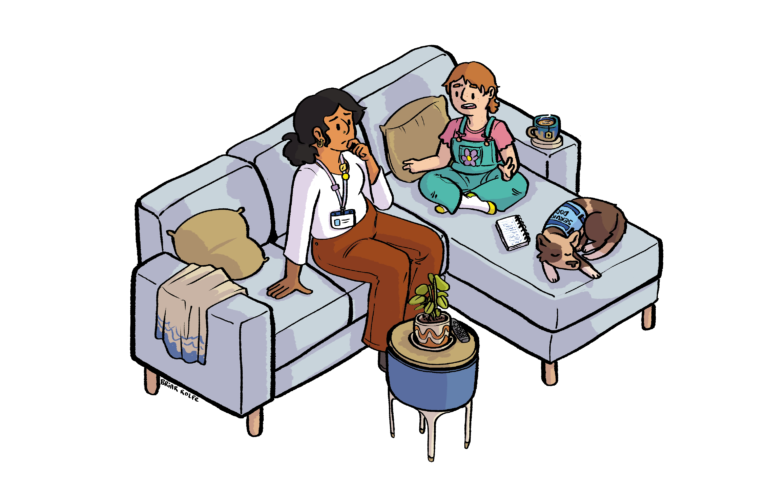Where to get help
If something is wrong or worrying you, it’s okay to ask for help.
You don’t have to deal with it on your own. There are people who will listen and support you.
Remember:
- You can ask for help as many times as you need.
- You can ask multiple people—you don’t have to rely on just one person.
Speaking up is the first step to fixing a problem.
 Illustration of a white disabled young person sitting on a couch, in conversation with a worker. There's a service dog asleep next to them.
Illustration of a white disabled young person sitting on a couch, in conversation with a worker. There's a service dog asleep next to them.
Where to go if you need help
It can be tricky knowing where to get help, especially if you have a problem with you NDIS service providers or support workers.
The good news is there are lots of places you can ask for help!
People you know
You might feel most comfortable asking someone you already know, like:
- Family and/or carers
- Teachers
- Support workers
- Friends
- People you work with
- Your doctor or healthcare team
People you don’t know
Sometimes, it helps to talk to someone outside of your life, like:
- Advocates like YDAS (Youth Disability Advocacy Service)
- Phone counsellors who you can call for support.
- Online counsellors/web chats who you can message for help.

Disabled young people share who supports them to speak up.
Check out this video of disabled young people sharing their experiences of asking for help when they faced problems with their supports and services.
How to ask for help
Some people find it hard to ask for help, and that’s okay!
Here are some steps to make asking for help easier:
- Decide who to ask – Think about someone you trust, like a friend, family member, teacher, support worker, or counsellor.
- Figure out what’s wrong – If you’re not sure how to explain the problem, that’s okay. You can still share how a situation is affecting you. For support figuring out what’s wrong, check out ‘Something is wrong‘.
- Decide what kind of help you want
- Do you want them to listen?
- Do you want advice?
- Do you want them to support you in taking action?
- You can also say: “I need help, but I don’t know what kind of help I need.”
Asking for help is brave. It might feel scary, but that doesn’t mean you shouldn’t do it.
If you’re unsure how to ask for help, Kids Helpline has a great guide you can check out.
How to ask for helpNDIS supports and services
You can ask for help with any problem or worry, including concerns about your NDIS supports and services.
This might mean talking to your NDIS service provider directly, getting help from an advocate, or making a complaint to the NDIS Commission. There are people and organisations whose job it is to listen and support you.
To find an advocate in your area, visit Ask Izzy’s Disability Advocacy Finder or AFDO’s list of advocacy organisations.
Illustration by Victoria.
Stay safe
Call 000 if you are in danger now. If someone is hurting you or you feel unsafe, tell someone you trust as soon as you can.
You can also contact Kids Helpline anytime on 1800 55 1800 or chat to them on the Kids Helpline website. They provide free support to people who are 25 years old or younger. No problem is too big or too small.
Kids Helpline has also created a guide to staying safe when leaving right away isn’t an option.
Support for First Nations young people
Here are some First Nations led organisations you can contact if you are feeling worried, need to talk, or need advocacy support.
Contact 13YARN on 13 92 76 (24 hours/7 days) to talk with an Aboriginal or Torres Strait Islander Crisis Supporter, or visit their website at the link below.
You can get free advocacy support through the First Peoples Disability Network.